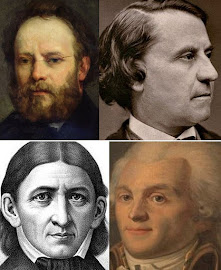Signs of the Times.
[by C. F. W. Walther, quoting the Spectator newspaper]
We cannot refrain from communicating to our readers the continuation of that correspondence which is to be found in the latest numbers of the Spectator on the Potomac and of which we have already communicated the beginning in the last number of Der Lutheraner [see part 1]. It reads as follows:
The decline of religion in Germany described in my last letter could not fail to exert its influence on the Germans in the United States. For the last 15 years, communities have been formed to help "reason to its rights" in order to throw down the gauntlet to "blind faith in authority" and "clerical rule". The Lichtfreund, Antipfaff, and the Fackel were the leading journals of this movement; Ginal and Försch the most outstanding personalities. Although many political journals gave signs here and there of favoring this direction, self-interest was sufficient to keep them in check, as public opinion was all too clearly against it and they did not like to lose their subscribers. As a result of the political upheavals that took place in Germany in 1848, a number of political refugees arrived here [in America] who gave new impetus to the anti-religious movement, and as editors of the most influential newspapers, the management of which was entrusted to them because of their literary reputation, they now formally organized this movement.
Now, however, they were no longer merely striving to overthrow the "blind faith in authority" and the "rule of the priests" and to help "reason" to its rightful place, but all relationships in human society, the family and the state, were to be totally transformed. Belief in God was to be eradicated, property abolished, marriage abolished. All this is hoped to be achieved through the workers' associations that have been transplanted here from Germany and whose pretended prospect is irreproachable. They are a voluntary association; they seek general and industrial training, moral strengthening and social amusement, which they need, and want to provide them for each other in community. They aim at fraternization and mutual support. All this would be irreproachable; but they do not stop there; they go beyond God and Christ, beyond church and religion to the struggle against property, family, marriage and morality. Mr. [Wilhelm] Rosenthal, President of the Workers' Congress recently held in Philadelphia, declared in the Sunday paper Wild Roses, which he publishes:
“I am an atheist! As such I deny the existence of a being from whom everything that is and is not there is supposed to proceed, and to whom the name of God is usually applied.”
Let us now take a look at the "workers' associations" in Germany, on whose model the German workers' associations in the United States were modeled, in order to learn to understand what goals they are striving for.
The central organ of the workers' associations in Germany is Die Verbrüderung. [The Brotherhood, editor Stephan Born] In this journal, the speeches of [Pierre-Joseph] Proudhon, Louis Planes [Louis Blanc?], Fröbel and Robespierre are always at the top. In one of its issues it proclaims: "The servants of the Church unite with the howlers of the State, because both have the same interest in life: both speculate on the suppression of free human dignity. They want to rob the people of the earth, so they point them to heaven with assignats [money]; they preserve them with satanic cunning — in the contrition necessary for blind church faith, by letting them wither away physically. That is why the clergy, in their well-understood interests, have always had it in for the minority, for princes and nobility, against the people and their material redemption from pressure and misery.
In one meeting, a speaker expressed himself as follows:
“Feuerbach taught us to place and look at the spiritual God, whom we imagine as existing outside of us, separate from us, within us. In the same way, we don't want to let the material God of the world, Mammon, exist outside of us, not in relation to us, but within us. — We don't hope for eternal life, for retribution up there, as long as it doesn't get better still down there: — The desire to be better up there was invented by egoism and greed. — Says the priest comfortingly: ‘It will be repaid up there!’ — or: ‘The good Lord will help!’ — We — don't wait, don't want to rely on it.”
Another voice cries out:
"Religion is indifferent or hostile to the truth unless it serves its interests, the balance of the soul. The proper doubt does not return to faith, but proceeds to action. — What criticism has destroyed, you find again in the world, which is a worthy object of love. — This is the love of the new democracy. — There is nothing absolute."
Feuerbach, who wanted to redeem the German nation from the delusion of religion, scolded a clergyman who still preached an idol, the love of man; this religion must be destroyed by egoism.



No comments:
Post a Comment
Comments only accepted when directly related to the post.